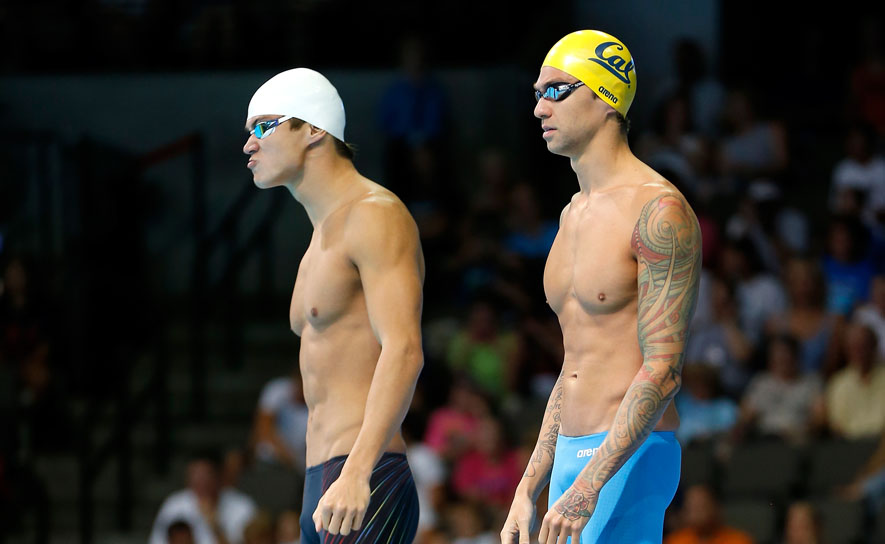USA Swimming News
5 Things You Can Do to be More Mentally Tough

by Olivier Poirier-Leroy//Contributor
Mental toughness is one of those aspects to fast swimming that we know all elite swimmers possess, but is ultimately hard to measure. We can track a swimmer’s efficiency, their velocity—but quantifying their mental fortitude is a little trickier.
There are a couple things we do know about mental toughness, or resiliency, or perseverance—it’s critical, and it is something we can improve and strengthen, just like a muscle.
Here are five ways that you can be a mentally tougher swimmer and reap the benefits of better training and faster swimming:
1. Embrace the challenges.
Given the option, a mentally tough athlete will welcome a challenge. They know and understand that improvement comes in the little chasm between the set they know they can do and the set they haven’t done yet.
While some swimmers will sigh, grumble and complain when the tough stuff is written up on the whiteboard, the swimmer who is mentally tough will welcome it—for they know that these are the moments where improvement springs from.
2. Learn from your mistakes.
At some point—or many points, as is the case with most of us—we stumble on our journey to swimming awesomeness. No matter how grand or modest our goal, it is inevitable that there will be points where we mess up.
Perhaps we thought it would be easier, or we were living the lifestyle of a part-time athlete while hoping for full-time results.
While some swimmers will take mistakes as proof that they aren’t worthy, or that it’s too hard, our mentally tough athlete applies the lessons of their mistake and moves forward.
3. Use your setbacks as fuel for the next step.
Perhaps the biggest mark of a mentally tough swimmer is in the way they react to disappointment and failure.
Look, we all take our losses a little personally. This is natural. But the difference is whether you take it as a challenge to do better next time, or as an indictment of your swimming abilities.
As an example, being injured is a common occurrence for athletes, and swimmers are not immune. We all experience them. For the mentally tough athlete they vow to come back stronger and faster than they were before.
Another example: It’s common for swimmers to open a big meet with a bad swim. The nerves and jitters are running high. A mentally tough swimmer will use that bad swim as motivation to correct themselves and bounce back.
Use your setbacks and failures as jet fuel for what is to come.
4. Keep your eyes in your own lane.
Competitive swimming is a, well, competitive sport. We race our teammates in practice, we race the competition at meets. How we finish is largely dependant on how others perform, and not just how well we perform.
Using your competitive instincts to help you train and race at your peak is great, and is part of what makes the sport enjoyable. However, there is a point where constant comparison-making and paying attention to what others are doing where it becomes counter-productive.
Mentally tough swimmers understand that there are limits to what they can influence and control, and spend a majority of their energy and time mastering themselves.
5. Don’t wait for the mood to train hard to strike ya.
Not everyone has access to a 50m pool, or the best coaching on the planet, or an expensive tech suit. (I spent my first year of university training in two pools; one was treated with bromine, which literally made me wretch anytime I got a mouthful, and the other was 21 yards long. And no, that’s not a typo).
And truthfully, we don’t need all the fancy stuff. Mentally tough swimmers are willing to make the absolute most of whatever they have in front of them.
They know success isn’t going to come down to who has the best facility. It is going to come down to who put in the work. As such, they don’t make excuses for their training environment, or wait for better and more ideal circumstances to give a full effort.
Olivier Poirier-Leroy is a former national level swimmer. He is a regular contributor of Splash Magazine and also writes over at YourSwimLog.com, where he shares swimming workouts from coaches and swimmers across the country.
He is also the publisher of YourSwimBook, a ten-month log book and mental training skills guide for competitive swimmers. You can learn more about it by clicking here.
